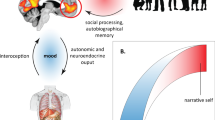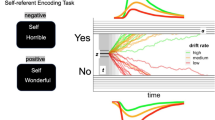Abstract
This paper tests Beck's theory that depressives uniformly have stable cognitive patterns for interpreting environmental information. Specifically, it is questioned whether depressives have schemata for interpreting (or distorting)information relative to their beliefs and self-attitudes. Thirteen depressives were compared with 13 nondepressives in the subjective organization of self-descriptive adjectives on multitrial free recall as well as in the clustering of words on final free recall. As expected, level of depression was negatively related to the subjective organization of adjectives but held no systematic relationship with the subjective organization of abstract nouns. Likewise, depression was associated with lower category cluster on final free recall. These results suggest that some depressives may lack stable cognitive schemata for interpreting personal information. Implications are discussed relative to Beck's cognitive model, to Seligman's learned helplessness reformulation, and to cognitive behavior therapy.
Similar content being viewed by others
Reference Notes
Davis, H.Self-reference as related to 17-hydroxycorticosteroid secretion in adult depression. Izaak Walton Killam Archives. University of Calgary, 1979.
Davis, H.Memory for personal adjectives in adult depression. Unpublished doctoral dissertation. University of Calgary, 1979.
References
Abramson, L. Y., Seligman, M. E. P. & Teasdale, J. D. Learned helplessness in humans: Critique and reformulation.Journal of Abnormal Psychology 1978,87 49–74.
Beck, A. T.Depression: Causes and treatment. Philadelphia: University of Pennsylvania Press, 1967.
Beck, A. T., & Beamesderfer, A. Assessment of depression: The depression inventory. In P. Pichot (Ed.),Psychological measurements in psychopharmacotogy (Vol. ??). Basel: Karger, 1974.
Beck, A. T., & Rush, A. J. Cognitive approaches to depression and suicide. In G. Serben (Ed.).Cognitive deficits in the development of mental illness. New York: Brunner Mazel. 1978.
Beck, A. T., Rush, A. J., Shaw, B. F., & Emory, G.Cognitive therapy of depression: A treatment manual. Philadelphia: A. T. Beck, 1978.
Bellezza, F. S., Cheesman, F. L., & Reddy, G. Organization and semantic elaboration in free recall.Journal of Experimental Psychology: Human Learning and Memory 1977,3 539–550.
Bibring, E. The mechanism of depression. In P. Greenacre (Ed.),Affective disorders. New York: International Universities Press, 1965.
Bjorklund, D. F., Ornstein, P. A., & Haig, J. R. Developmental differences in organization and recall: Training in the use of organizational techniques.Developmental Psychology 1977,13 175–183.
Davis, H. Self-reference and the encoding of personal information in depression.Cognitive Therapy and Research 1979,3 97–110.
Depue, R. A., & Monroe, S. M. Learned helplessness in the perspective of the depressive disorders: Conceptual and definitional issues.Journal of Abnormal Psychology 1978,87 3–20.
Leighner, J. P., Robins, E., Guze, S. B., Woodruff, R. A., Winokur, G., & Munoz, R. Diagnostie criteria for use in psychiatric research.Archives of General Psychiatry 1972,26 57–63.
Frankel, F., & Cole, M. Measures of category clustering in free recall.Psychological Bulletin 1971,?? 39–44.
Freud, S. Mourning and melancholia (1917). In J. Strachey (Ed. and trans.),The standard edition of the complete psychological works of Sigmund Freud. London: Hogarth Press, 1955.
Kovacs, M., & Beck, A. T. An empirical-clinical approach toward a definition of childhood depression. In J. G. Schulterbrandt & A. Raskin (Eds.).Depression in childhood: Diagnosis, treatment, and conceptual models. New York: Raven Press, 1977.
Paivio, A., Yuille, J. C., & Madigan, S. A. Concreteness, imagery, and meaningfulness values for 925 nouns.Journal of Experimental Psychology Monograph 1968,76(1, Pt. 2), 1–25.
Rogers, T. B., Kuiper, N. A., & Kirker, W. S. Self-reference and the encoding of personal information.Journal of Personality and Social Psychology 1977,35 677–688.
Sternberg, R. J., & Tulving, E. The measurement of subjective organization in free recall.Psychological Bulletin 1977,84 539–557.
Thorndike, E. L., & Lorge, I.The teachers word book of 30,000 words. New York: Bureau of Publications of Columbia University, 1952.
Author information
Authors and Affiliations
Additional information
Appreciation is expressed to W. R. Unruh and one anonymous reviewer for encouragement and assistance in the preparation of this research. Appreciation is also extended to R. Murphy for his assistance in the collating of data. The research was carried out as a pilot study for the author's doctoral dissertation. An Izaak Walton Killam Memorial Scholarship partially supported its execution, while the Calgary Family Service Bureau supported its preparation.
Rights and permissions
About this article
Cite this article
Davis, H. The self-schema and subjective organization of personal information in depression. Cogn Ther Res 3, 415–425 (1979). https://doi.org/10.1007/BF01184457
Issue Date:
DOI: https://doi.org/10.1007/BF01184457




